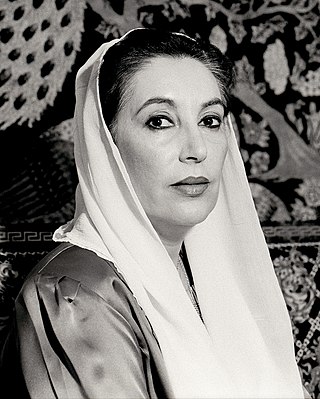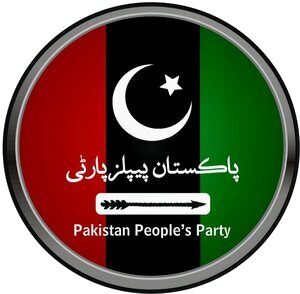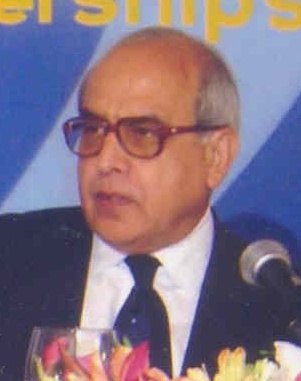Anti-Arab racism includes opposition to, dislike, fear, or hatred of Arab people.

Benazir Bhutto was a Pakistani politician and stateswoman who served as the 11th and 13th prime minister of Pakistan from 1988 to 1990 and again from 1993 to 1996. She was the first woman elected to head a democratic government in a Muslim-majority country. Ideologically a liberal and a secularist, she chaired or co-chaired the Pakistan People's Party (PPP) from the early 1980s until her assassination in 2007.

Muhammad Zia-ul-Haq was a Pakistani military officer who served as the sixth president of Pakistan from 1978 until his death. He also served as the second chief of the army staff of the Pakistan Army from 1 March 1976 until his death.

Zulfikar Ali Bhutto was a Pakistani barrister, politician, and statesman. He served as the fourth president of Pakistan from 1971 to 1973 and later as the ninth prime minister of Pakistan from 1973 to 1977. Bhutto founded the Pakistan People's Party (PPP) and served as its chairman until his execution.

The Pakistan People's Party is a centre-left political party in Pakistan. It is currently the first-largest party in the Senate and third-largest party in the National Assembly. The party was founded in 1967 in Lahore, when a number of prominent left-wing politicians in the country joined hands against the military rule of president Muhammad Ayub Khan, under the leadership of Zulfikar Ali Bhutto. It is affiliated with the Socialist International. The PPP's platform was formerly socialist, and its stated priorities continue to include transforming Pakistan into a social-democratic state, promoting egalitarian values, establishing social justice, and maintaining a strong military. The party, alongside the Pakistan Muslim League-Nawaz and the Pakistan Tehreek-e-Insaf, is one of the three largest political parties of Pakistan.

The Pakistan Muslim League (Nawaz) (Urdu: پاکستان مسلم لیگ (ن), abbr.PML(N) or PML-N) is a centre-right, conservative liberal political party in Pakistan. It is currently the third-largest party in the Senate. The party was founded in 1993, when a number of prominent conservative politicians in the country joined hands after the dissolution of Islamic Democratic Alliance, under the leadership of former Prime Minister Nawaz Sharif. The party's platform is generally conservative, which involves supporting free markets, deregulation, lower taxes and private ownership. Although the party historically supported social conservatism, in recent years, the party's political ideology and platform has become more liberal on social and cultural issues; however, members have been accused of using Islamist populist rhetoric. Alongside the Pakistan Tehreek-e-Insaf (PTI) and Pakistan People's Party (PPP), it is one of the three major political parties of the country.

The Pakistan Muslim League Urdu: پاکستان مسلم لیگ (ق); Pākistān Muslim Līg (Qāf), Acronyms: PML(Q), PML-Q, PMLQ, "Q League" is a political party in Pakistan. As of the 2024 parliamentary election, it has a representation of 5 seats. It previously served as an ally of former Prime Minister Raja Pervez Ashraf's government, and led a joint election campaign in 2013 alongside Pakistan Peoples Party (PPP) in Punjab and Balochistan provinces against its rival Pakistan Muslim League (N), a fiscally conservative and centre-right force.

Farooq Ahmad Khan Leghari, was a Pakistani politician who served as the eighth president of Pakistan from 14 November 1993 until resigning on 2 December 1997. He was the first Baloch to be elected as President.

Jamaat-e-Islami, or Jamaat as it is commonly known, is an Islamist political party based in Pakistan and founded by Abul Ala Maududi. It is the Pakistani successor to Jamaat-e-Islami, which was founded in colonial India in 1941. Its objective is the transformation of Pakistan into an Islamic state, governed by Sharia law, through a gradual legal, and political process. JI strongly opposes capitalism, communism, liberalism, and secularism as well as economic practices such as offering bank interest. JI is a 'vanguard party', whose members are intended to be leaders spreading party beliefs and influence. Supporters not thought qualified to be members may become 'affiliates', and beneath them are 'sympathizers'. The party leader is called an 'ameer'. Although it does not have a large popular following, the party is quite influential and considered one of the major Islamic movements in Pakistan, along with Deobandi and Barelvi.
The American-Arab Anti-Discrimination Committee (ADC) states that it is "the largest Arab American grassroots civil rights organization in the United States." According to its webpage it is open to people of all backgrounds, faiths and ethnicities and has a national network of chapters and members in all 50 states. It claims that three million Americans trace their roots to an Arab country.

James Joseph Zogby is the founder and president of the Arab American Institute (AAI), a Washington, D.C.–based organization that serves as a political and policy research arm of the Arab-American community. He is Managing Director of Zogby Research Services, LLC, specializing in research and communications and undertaking polling across the Arab world. In September 2013 President Obama appointed Zogby to the United States Commission on International Religious Freedom. Zogby is a lecturer and scholar on Middle East issues and a Visiting Professor of Social Research and Public Policy at New York University Abu Dhabi. From 2001 to 2017 he was a member of the Executive Committee of the Democratic National Committee.

Tehreek-e-Jafaria Pakistan, formerly Tehreek Nifaz Fiqah-e-Jafaria Arif Hussaini/Sajid Naqvi Group was the Shia political party in Pakistan from 1979 to 2000. Belonging to the Ja'fari school of Islamic jurisprudence, TNFJ was founded in 1979 by Syed Arif Hussain Al Hussaini supported by Grand Ayatollah Muhammad Hussain Najafi Dhaku. Its creation coincided with the enforcement of controversial Islamic laws by then President of Pakistan, General Mohammad Zia-ul-Haq. At the same time, 1979 Iranian Revolution in Shi'a Iran added extra confidence and comfort in the movement.
The Arab lobby in the United States is a collection of formal and informal groups and professional lobbyists in the United States paid directly by Gulf Arab states and private donors on behalf of the Arab states.

The Sindh Muslim Government Law College or S. M. Law College is one of the oldest law schools of Pakistan, situated in Karachi, Sindh. The college has produced numerous notables including Chief Justices of Pakistan, Chief Justices of Federal Shariat Court, Chief Ministers of Sindh, Federal Ministers, and many judges of the Supreme Court of Pakistan and Sindh High Court.

Pakistan–Palestine relations refer to the bilateral relations between Islamic Republic of Pakistan and State of Palestine. The Palestinian Authority established an embassy in Islamabad on 31 January 2017. Pakistan remains a staunch supporter of the proposal for the creation of an independent Palestinian state, and in line with its pro-Palestinian doctrine, does not recognize the State of Israel. However, the former President of Pakistan, Pervez Musharraf, stated that Pakistan will recognize Israel's sovereignty if the latter withdraws its forces from the Israeli-occupied territories and allows an independent Palestinian state to be established within the Green Line that served as the international border between Israel and the Palestinian territories from the First Arab–Israeli War of 1948 to the Third Arab–Israeli War of 1967. Pakistan frequently provides various forms of humanitarian aid to the Palestinian Authority.
The story of history of the Islamic Republic of Pakistan began on 14 August 1947 when the country came into being in the form of Dominion of Pakistan within the British Commonwealth as the result of Pakistan Movement and the partition of India. While the history of the Pakistani Nation according to the Pakistan government's official chronology started with the Islamic rule over Indian subcontinent by Muhammad bin Qasim which reached its zenith during Mughal Era. In 1947, Pakistan consisted of West Pakistan and East Pakistan. The President of All-India Muslim League and later the Pakistan Muslim League, Muhammad Ali Jinnah became Governor-General while the secretary general of the Muslim League, Liaquat Ali Khan became Prime Minister. The constitution of 1956 made Pakistan an Islamic democratic country.
The family of head of state and government in Pakistan is an unofficial title for the family of the head of state or head of government of a country. In Pakistan, the term First Family usually refers to the head of state or head of government, and their immediate family which comprises their spouse and their descendants. In the wider context, the First Family may comprise the head of state or head of government's parents, siblings and extended relatives.

Majlis Wahdat-e-Muslimeen is a Pakistani Shi'a Islamic political organization. Its headquarters are in Islamabad. MWM Pakistan works to establish an Islamic democratic welfare state, particularly emphasising Shi'a-Sunni unity.
Conservatism in Pakistan, generally relates to the traditional, social, and religious identities in the politics of Pakistan. American historian Stephen Cohen describes several political constants in Pakistan's conservatism: respect for tradition, the rule of law and the Islamic religion which is integral in the idea of Pakistan.













